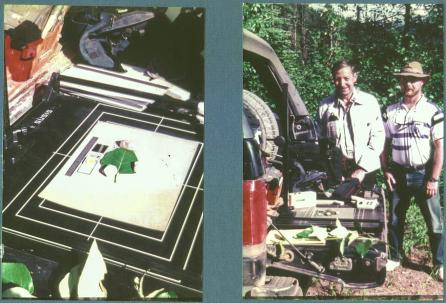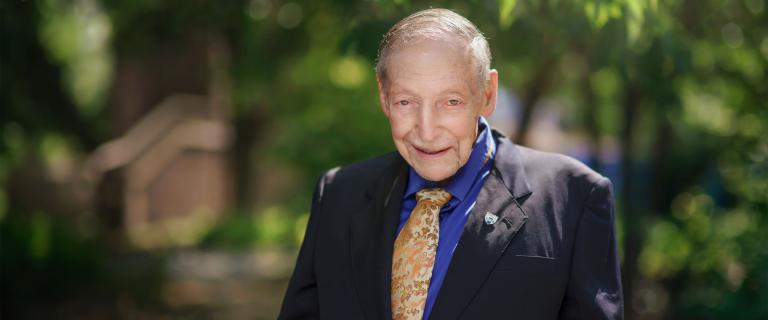


Graeme P. Berlyn, a world-renowned expert on the anatomy and physiology of plants and trees who taught at the Yale School of the Environment (YSE) for more than 60 years, died February 16 in Hamden, Connecticut. He was 90.
Berlyn’s breadth of research included wood anatomy, plant embryology, tissue culture, biotechnology, and the morphology and physiology of trees and forests in relation to environmental stress. He published more than 166 journal articles and his book, “Botanical Microtechnique and Cytochemistry,” has more than 2,200 citations. He was an expert on histology and electron microscopy and served as the only plant scientist on the Biological Stain Commission, the international organization that sets the guidelines for the acceptable biotechnique of staining and preparing histological samples, primarily in medicine.
After working for the U.S. Forest Service in Oregon and Washington, Berlyn came to YSE in July, 1960 at the age of 26. His early work at YSE focused on wood science and cell development, specifically on cottonwood.

Through the decades, Berlyn, E. H. Harriman Professor of Forest Management and Physiology of Trees, became a beloved presence at Greeley Memorial Lab where he would host weekend lunches in the kitchen with his research students, serving meals he cooked and nutrition drinks he had created, often with his dogs by his side. He enjoyed working out with weights in the basement in what fondly became known as the “Heavy Metals Uptake Lab” to the tunes of Texas swing. Berlyn liked to jog, even before that became popular, was an avid hiker, and also pursued martial arts including Taekwondo.
While at YSE, Berlyn broadened his research focus on wood cellular structure, examining the nuclear effects of radiation on plants; the adaptation of spruce fir to acid rain across elevation gradients; and leaf morphology and physiology responses to light. One of his most cited papers was on chlorophyll fluorescence. In the 1990s, he pioneered the development of non-hormonal plant biostiumulants and created a line of plant food called “Roots” that helped fund his subsequent research.
Berlyn was involved in the formation of the Tropical Resources Institute (TRI) and participated in a School trip to Jamaica and TRI's first formal field trip to Puerto Rico in 1984, as well as subsequent trips to Venezuela, Costa Rica, Japan, and British Columbia. He also worked in the mountains of British Columbia and the northeastern U.S., collecting plant samples at different gradients.
In 2014 Berlyn worked on developing green wall technology that used recirculated water as an alternative to cooling towers. In 2021, he won the Audience Choice Award at Startup Yale with Kevin Gallagher ’20 YC for a nonfertilizer biostimulant that helps farmers grow more crops with less land. His recent research included collaboration with colleagues on blue carbon involving sea grass.
At the heart of all his work was his commitment to his students, said Mark Ashton, senior associate dean of The Forest School at YSE and Morris K. Jesup Professor of Silviculture and Forest Ecology. Ashton first met Berlyn in the 1980s while he was getting his master’s and doctorate at YSE and Berlyn became his mentor.
His students were devoted to him because he was devoted to them.”
Berlyn, who liked to dress in black, could seem intimidating and gruff at first, but he was the opposite, Ashton said.
“He was an absolute softy. If you were a serious student and he saw you working hard, he offered lifetime mentorship. He was an extremely giving person,” Ashton said. “His students were devoted to him because he was devoted to them.”
When one of his students became ill with cancer, Berlyn, who was director of graduate studies at YSE at the time, stayed with him in the hospital until he died.
“The saddest thing for me was losing Anders Claeson, a student here who wanted to do doctoral work on Caribbean Pine in Fiji. It’s painful losing someone so young,” Berlyn recalled in an interview with the alumni office about his time at YSE.
Over the years, Berlyn took great pride in the accomplishments of his former students.
“That’s probably the greatest part of the job — the students we’ve had here,” Berlyn said. “I’ve mentored a number of PhD students … a number of them went on to become professors at various universities and so that’s a very satisfying part of being a professor, that your students make a mark for themselves. And all of them have in one way or another.”
Dean Indy Burke noted Graeme’s enthusiastic mentoring of alumni.
“Our alumni feel a deep sense of connection to Graeme, who came to every reunion to catch up with his students and friends, and they have remained in touch through the years and decades. Graeme graced us all with his sharp intellect, wry grin, and sense of humor. He remained deeply committed to diversity, equity, and inclusion throughout his entire career, helping us advance our efforts in this important area especially over the last decade. We will miss him deeply,” she said.
When he arrived as an assistant professor at YSE, Craig Brodersen said Berlyn was generous in sharing his knowledge of the School.
“Graeme had an incredible wealth of knowledge not only about plant anatomy, development, and physiology, but also about the history of our School. That kind of institutional knowledge, some of it now passed on to me, has been extremely helpful in better understanding YSE’s past and current role both here at Yale and more broadly,” said Brodersen, professor of plant physiological ecology. “He was a kind, generous person and I learned a lot from him over the past 10 years working with him. I feel deeply honored to be carrying on the tradition of teaching and research related to plant anatomy and physiology that he helped sustain here at YSE.”
YSE students and alumni recalled Graeme’s openness, cultural sensitivity, and ability to inspire scientific curiosity.
Andrew Richardson ’98 MF ’03 PhD, professor at the School of Informatics, Computing, and Cyber Systems at Northern Arizona University, said Berlyn was more than a role model to him, showing him how to persevere through tough times.
“I showed up at Yale in the fall of 1996, an enthusiastic but naive first-year MF student, knowing little about forest ecology, silviculture, or plant physiology (my undergraduate degree had been in economics). Nevertheless, Graeme took me on as a research assistant, and over the next seven years, he trained me, mentored me, and supported me in ways that enabled me to grow as a scientist and scholar, and learn from my mistakes,” Richardson said. “This was a difficult time for Graeme. He had been diagnosed with cancer, and though he must have suffered enormously from the chemotherapy treatments, he still made it into the lab virtually every day.”
Graeme graced us all with his sharp intellect, wry grin, and sense of humor. He remained deeply committed to diversity, equity, and inclusion throughout his entire career, helping us advance our efforts in this important area especially over the last decade. We will miss him deeply.”
Helen Poulos ’07 PhD, a forest and fire ecologist and associate professor of earth and environmental sciences at Wesleyan who co-authored 10 peer-reviewed studies with Berlyn, remembered her lunchroom conversations with him at Greeley Lab while she was a doctoral student.
“It was through those lunchroom conversations that I started working with Graeme and decided to take his classes. He was just available to students in a way that made it easy to talk with him, ask questions, think about big ideas, design experiments, and do research,” she said. “Graeme's fascination with the dynamic lives of trees was infectious. He taught me, and thousands of other Yalies how plants survive, grow, and reproduce through the lens of plant ecophysiology. I will be forever grateful for my time with him.”
Muhammad Sohail Yousaf, a postdoctoral fellow at the Greeley Lab who had been working closely with Berlyn, noted his scientific expertise.
“What stood out to me the most about Graeme was his unwavering commitment to excellence. Whether it was in the classroom, in his research, or in his interactions with others, he always strived for the highest standards and encouraged those around him to do the same. Graeme's contributions to the field were significant and far-reaching. His research pushed the boundaries of our understanding and opened up new avenues for exploration. His dedication to advancing the field will continue to impact generations of scholars,” he said.
Kaisone Phengsopha ’05 MEM, acting dean of the faculty of environmental science at the National University of Laos, said Berlyn made every student at YSE feel welcomed.
“Professor Berlyn was not only an exemplary scholar but also a guiding light for many of us. His dedication to nurturing young scientists from diverse backgrounds was not limited to students from the U.S. He left an indelible mark on the academic journeys and personal growth of foreign students including myself. During my student days at Yale, I am particularly grateful for his showing me the concern on and interests in the history and tradition of my country, Korea. He embodied the true spirit of Yale's academic excellence and compassion, inspiring not just a passion for learning but a deep commitment to making a meaningful impact in the world,” Phengsopha said.
Berlyn is survived by his wife Mary Berlyn ’66 PhD, and two children, Dina and John. YSE is planning a recognition ceremony in coordination with Berlyn’s family that will be announced at a later date.
Share Your Memories and Photos